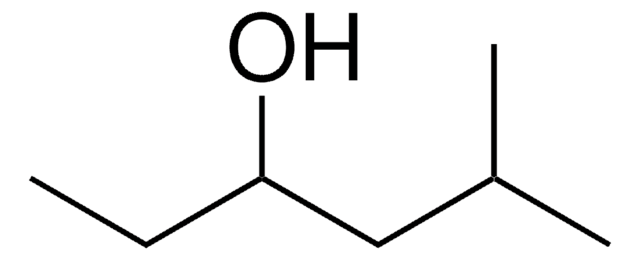All Photos(1)
About This Item
Linear Formula:
(CH3)2CHCH2CH2CHOHCH3
CAS Number:
Molecular Weight:
116.20
Beilstein:
1731619
EC Number:
MDL number:
UNSPSC Code:
12352100
PubChem Substance ID:
NACRES:
NA.22
Recommended Products
Quality Level
Assay
98%
form
liquid
refractive index
n20/D 1.417 (lit.)
bp
148-150 °C (lit.)
density
0.819 g/mL at 25 °C (lit.)
functional group
hydroxyl
SMILES string
CC(C)CCC(C)O
InChI
1S/C7H16O/c1-6(2)4-5-7(3)8/h6-8H,4-5H2,1-3H3
InChI key
ZDVJGWXFXGJSIU-UHFFFAOYSA-N
Looking for similar products? Visit Product Comparison Guide
Related Categories
General description
5-Methyl-2-hexanol is a non-crystallizable secondary alcohol and its complex relative permittivity has been measured over wide range of temperatures and pressures.
Application
5-Methyl-2-hexanol has been used as internal standard for rapid extraction of aroma compounds from grape brandies and aqueous-alcoholic wood extracts by ultrasound.
Signal Word
Warning
Hazard Statements
Hazard Classifications
Flam. Liq. 3
Storage Class Code
3 - Flammable liquids
WGK
WGK 3
Flash Point(F)
86.0 °F - closed cup
Flash Point(C)
30 °C - closed cup
Personal Protective Equipment
dust mask type N95 (US), Eyeshields, Gloves
Choose from one of the most recent versions:
Already Own This Product?
Find documentation for the products that you have recently purchased in the Document Library.
Customers Also Viewed
Lee Wei Lim et al.
Scientific reports, 6, 37568-37568 (2016-11-22)
Tetratricopeptide repeat domain 9A (TTC9A) expression is abundantly expressed in the brain. Previous studies in TTC9A knockout (TTC9A
Li Guan et al.
Brain research bulletin, 157, 162-168 (2020-02-15)
The involvement of tetratricopeptide repeat domain 9A (TTC9A) deficiency in anxiety-like responses and behavioral despair through estradiol action on the serotonergic system has been reported. Emerging evidence suggests that estradiol is a potent modulator of neuroplasticity. As estradiol and neuroplasticity
S Pawlus et al.
The Journal of chemical physics, 135(8), 084507-084507 (2011-09-08)
The complex relative permittivity of a non-crystallizable secondary alcohol, 5-methyl-2-hexanol, is measured over a wide range of temperatures and pressures up to 1750 MPa (17.5 kbar). The data at atmospheric pressure (P = 0.101 MPa) are analyzed in terms of
Improved method for extraction of aroma compounds in aged brandies and aqueous alcoholic wood extracts using ultrasound.
Caldeira I, et al.
Analytica Chimica Acta, 513(1), 125-134 (2004)
J Granja-Soares et al.
Food chemistry, 333, 127450-127450 (2020-07-15)
The aged wine spirit is a beverage with great aromatic complexity. Their volatile compounds with odorant power coming from the distillate and from the wood used in its ageing, and the interactions that take place in the process, enhanced by
Our team of scientists has experience in all areas of research including Life Science, Material Science, Chemical Synthesis, Chromatography, Analytical and many others.
Contact Technical Service












